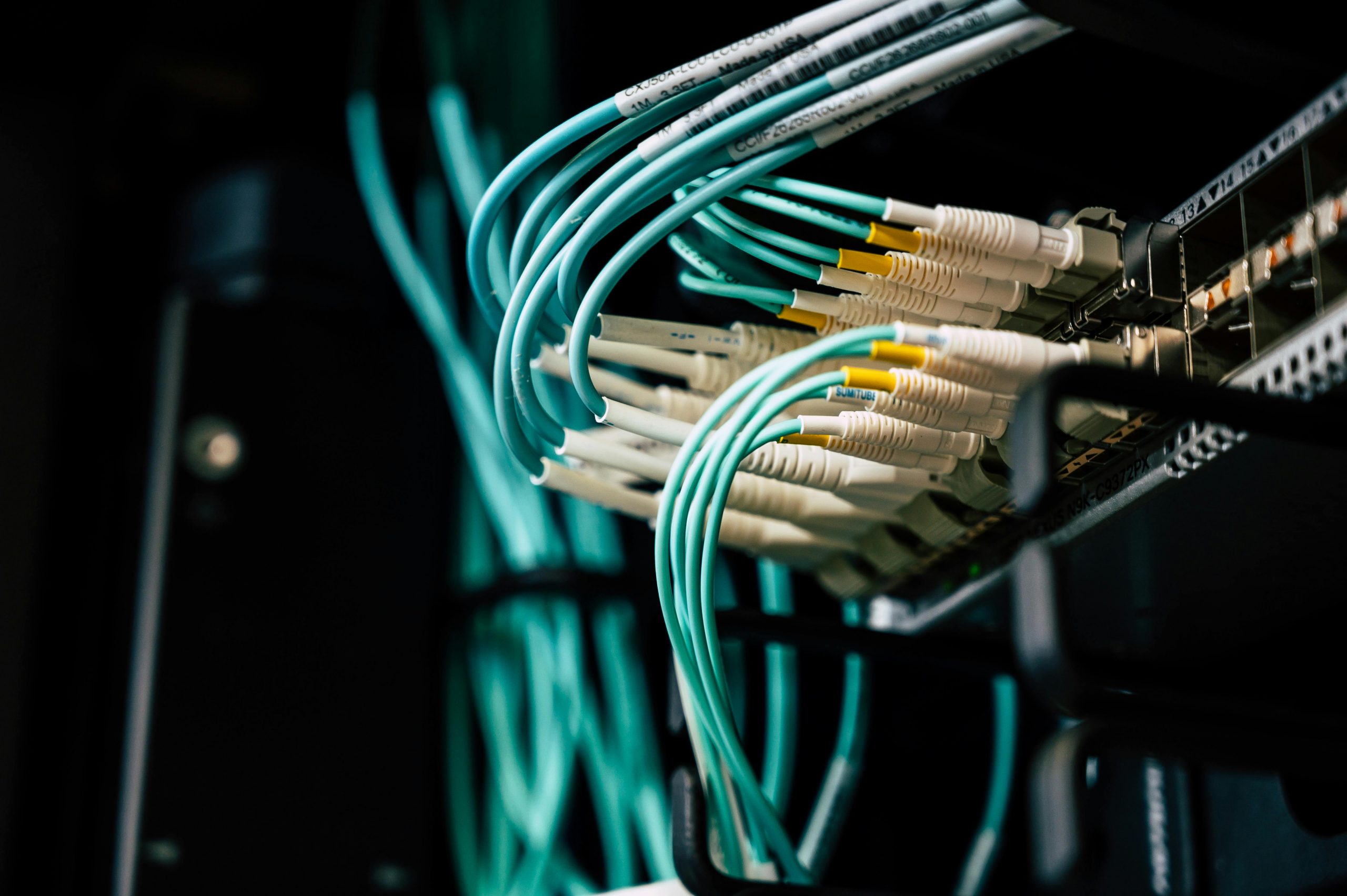
- Fiber delivers superior speed, reliability, and scalability, making it the better long-term investment for businesses that rely heavily on cloud services, video conferencing, or remote work.
- Cable internet remains a practical and affordable option for small businesses with lighter internet use or limited budgets, though it may experience slower speeds during peak hours.
- Upload speed matters as much as download speed — fiber’s symmetrical speeds support real-time communication, file sharing, and data backups far more efficiently.
- Reliability and uptime are critical for business productivity, and fiber’s resistance to interference and congestion ensures consistent performance even under heavy workloads.
- Cost differences between cable and fiber are narrowing, with fiber offering higher ROI over time due to improved performance and reduced downtime.
- Scalability and security favor fiber, which can easily support growing teams and protect sensitive data more effectively than cable.
- The right choice depends on availability, budget, and future growth plans, so businesses should evaluate their current needs and long-term connectivity goals before deciding.
When running a business, every second counts — and so does every byte of data. Whether you’re video conferencing with clients, managing e-commerce platforms, or relying on cloud-based applications, your internet connection is the invisible backbone of your daily operations. But when it’s time to choose between cable vs fiber internet, the decision isn’t always clear-cut.
In this comprehensive guide, we’ll break down how each connection works, compare their pros and cons, and help you decide which one best supports your business goals — today and in the future.
What’s the Real Difference Between Cable and Fiber Internet?
Before you can decide, it’s important to understand the basic technology behind each option.
Cable Internet uses the same coaxial cables that deliver traditional television services. It transmits data through copper wiring, where electrical signals carry information back and forth.
Fiber Internet, on the other hand, uses thin strands of glass or plastic fibers that transmit data as light signals. Because it uses light instead of electricity, fiber can carry much more data at much higher speeds and longer distances without signal loss.
Here’s a quick side-by-side comparison:
| Feature | Cable Internet | Fiber Internet |
| Transmission Method | Electrical signals through copper cables | Light signals through glass fibers |
| Speed Range | 100 Mbps to 1 Gbps | 250 Mbps to 10 Gbps or higher |
| Upload Speed | Typically lower (10–50 Mbps) | Symmetrical (same as download speed) |
| Latency | Moderate | Very low |
| Reliability | Affected by network congestion | Extremely consistent |
| Availability | Widely available | Growing, but not yet universal |
| Cost | Lower upfront | Higher installation cost |
So while fiber is the more advanced option, the right choice depends on your business’s priorities — cost, performance, and location all play major roles.
Why Does the Type of Internet Matter for Businesses?
For businesses, internet performance directly affects revenue, reputation, and productivity. Imagine running a customer support center where lag slows every call, or managing an online retail site that loses sales during downtime. The type of connection you choose can determine how efficiently your business operates.
Key reasons your internet choice matters include:
- Customer Experience: Fast and reliable connections help maintain smooth transactions and communications.
- Employee Productivity: Reduced lag and higher bandwidth mean faster collaboration and fewer disruptions.
- Cloud and SaaS Performance: Businesses using online platforms for storage, CRMs, or accounting systems depend heavily on upload speed and stability.
- Security: Some industries require secure, low-latency connections for compliance and data protection.
How Does Speed Impact Business Operations?
Speed is the most obvious factor when comparing cable vs fiber internet. But it’s not just about how fast files download — it’s also about how efficiently your business communicates and performs.
Download Speed: Determines how quickly your business can access data from the internet — like loading websites or receiving large files.
Upload Speed: Affects how fast you can send data — essential for video calls, file sharing, and cloud backups.
Latency: The delay between sending and receiving data. Low latency is crucial for real-time tasks like VoIP calls or online trading.
Here’s how internet speed impacts typical business activities:
- Email & Browsing: 25 Mbps or more is enough for small teams.
- Video Conferencing: 100 Mbps or more is ideal for clear video and stable connections.
- File Uploads & Backups: Fiber’s symmetrical speeds drastically improve upload efficiency.
- Remote Work & VPN Access: Low latency ensures smooth remote connections.
If your business relies heavily on cloud computing, video conferencing, or multiple users working simultaneously, fiber can make a significant difference in daily performance.
How Reliable Is Cable vs Fiber Internet?
Reliability is often the deal-breaker for many business owners. A dropped connection can interrupt meetings, cause lost sales, or even impact customer service operations.
Cable Internet Reliability:
Cable shares bandwidth with other users in your area. During peak hours — like lunchtime or after work — you might notice slower speeds because of network congestion. Additionally, copper cables are sensitive to electromagnetic interference and weather conditions, which can sometimes disrupt service.
Fiber Internet Reliability:
Fiber-optic cables are more resistant to interference, weather, and temperature changes. Because data travels as light, it’s not affected by electrical currents, making it less prone to outages or degradation. Fiber also provides consistent speeds, even during heavy usage periods, which makes it ideal for mission-critical business operations.
In short, if uptime and consistent performance are priorities, fiber is the clear winner.
What About Cost? Is Fiber Worth the Investment?
Price is one of the biggest deciding factors when comparing cable vs fiber internet. While fiber often costs more, its long-term benefits can outweigh the higher upfront expense.
Cable Internet Costs:
- Lower monthly fees and installation costs
- Often bundled with TV or phone services
- Ideal for small businesses with basic connectivity needs
Fiber Internet Costs:
- Higher installation costs (especially if new infrastructure is required)
- Monthly fees may be higher, but prices are steadily dropping
- Delivers greater long-term value through improved productivity and uptime
Think of fiber as an investment rather than an expense. The ROI comes from fewer outages, faster performance, and the ability to handle future bandwidth demands without constant upgrades.
How Do Upload Speeds Affect Your Business?
Most business owners focus on download speeds because that’s what affects web browsing and streaming. But upload speed is just as important — sometimes even more.
Cable internet typically offers asymmetrical speeds, meaning download speeds are much higher than upload speeds. That can cause bottlenecks when sending large files, hosting video calls, or syncing data to the cloud.
Fiber internet, on the other hand, provides symmetrical speeds — your uploads are just as fast as your downloads. This is especially beneficial for:
- Cloud-based businesses
- Marketing or creative teams transferring large media files
- IT departments managing remote servers or data centers
- Remote employees using VPNs or collaboration tools
If your business regularly uploads data, hosts webinars, or relies on real-time communication, symmetrical fiber speeds will eliminate frustrating slowdowns.
Which Option Is Easier to Scale as Your Business Grows?
Scalability is essential for growing businesses. You might start with a small team and minimal bandwidth needs, but what happens when your company expands, hires more staff, or adds new tech tools?
Cable Internet:
- Can accommodate small teams efficiently
- Limited bandwidth flexibility — higher tiers may not match fiber speeds
- Shared bandwidth can become an issue with more users
Fiber Internet:
- Offers much higher scalability potential
- Easy to upgrade speed plans without major infrastructure changes
- Handles high-demand applications like VoIP, video streaming, and massive file transfers
Fiber’s scalability makes it future-proof, allowing your business to grow without worrying about lagging behind in connectivity.
How Does Network Congestion Affect Businesses?
If you’ve ever noticed your internet slowing down during busy hours, you’ve experienced network congestion. This happens when too many users are online at once, straining the local network’s capacity.
With cable internet, congestion is common because multiple users share the same local loop. During peak times, performance drops as bandwidth is divided among subscribers.
Fiber internet, however, is designed to handle high-capacity data transfer with minimal slowdown. Its infrastructure can support higher data loads without affecting performance, meaning your business gets consistent speeds regardless of the time of day.
What About Security — Is Fiber Safer?
Security should never be an afterthought for businesses. Data breaches, hacking, and cyberattacks can devastate a company’s finances and reputation.
Fiber offers superior protection because of how it transmits data. Tapping into a fiber-optic cable requires physically cutting the line — which immediately disrupts the signal, making unauthorized interception extremely difficult.
Meanwhile, cable internet can be more vulnerable because copper lines transmit electrical signals that can be intercepted with the right equipment.
For industries handling sensitive client data — such as finance, healthcare, or legal services — fiber internet’s enhanced security can be a major advantage.
Is Availability a Limiting Factor?
Even though fiber is the superior technology, availability remains a challenge in some regions.
- Cable internet is widely available across cities, suburbs, and even rural areas.
- Fiber internet is expanding rapidly but is still limited in some areas, especially outside urban zones.
If fiber isn’t available in your location, you might consider hybrid options like business-grade cable or dedicated leased lines, which offer improved reliability over standard connections.
What Kind of Business Benefits Most from Fiber?
Fiber internet is an ideal choice for:
- Tech companies using cloud infrastructure and large data transfers
- Customer service centers relying on VoIP and real-time communication
- E-commerce and online retailers needing consistent uptime
- Creative agencies transferring massive media files
- Remote-first companies with distributed teams
Even small businesses can benefit from fiber if they depend on fast, stable connections for day-to-day operations. However, if your internet usage is moderate — emails, browsing, and occasional uploads — cable might still be sufficient.
How Do Installation and Setup Compare?
Cable installation is typically faster because most areas already have the necessary infrastructure. You can often get connected in a few days.
Fiber installation can take longer, especially if your area lacks existing lines. However, once installed, maintenance needs are minimal, and the connection is less prone to physical wear and tear.
If time is a critical factor and you need to get online quickly, cable might be the more immediate choice. But if you’re planning for long-term stability, the wait for fiber installation can pay off in the long run.
What Questions Should You Ask Before Choosing?
Before you make your decision, ask yourself these key questions:
- What’s our current and projected internet usage?
Consider how many employees, devices, and cloud applications rely on your network. - How critical is uptime for our business?
If even brief downtime causes disruption, fiber’s reliability could be worth the investment. - Are we planning to expand soon?
Growth requires scalable bandwidth — something fiber handles better. - Is fiber available in our area?
Check local providers before finalizing your decision. - What’s our budget for installation and monthly service?
Evaluate short-term affordability versus long-term performance gains.
Answering these questions will give you a clearer sense of whether fiber’s benefits justify the cost or if cable is a more practical fit for now.
Common Myths About Cable vs Fiber Internet
There are plenty of misconceptions surrounding this debate. Let’s clear up a few:
- Myth 1: Fiber is only for large enterprises.
Many small and mid-sized businesses now use affordable fiber plans. - Myth 2: Cable speeds are “good enough” for any business.
While cable can handle basic needs, high-demand tasks like cloud computing or HD conferencing push its limits. - Myth 3: Fiber is too expensive.
Fiber costs have dropped significantly over the past decade, and many providers offer competitive packages. - Myth 4: Fiber isn’t available anywhere near me.
Coverage is expanding quickly — check local business internet providers for updates.
How to Transition from Cable to Fiber
If you’re currently using cable and thinking about switching, here’s a simple roadmap:
- Assess your current needs – Analyze bandwidth usage and performance bottlenecks.
- Check availability – Contact providers in your area for fiber coverage.
- Plan installation – Coordinate downtime and hardware setup to minimize disruptions.
- Upgrade your hardware – Ensure routers and switches support higher speeds.
- Test and optimize – Run speed tests and monitor performance after the switch.
Most providers can handle the transition smoothly, ensuring minimal downtime during installation.
The Bottom Line: Which Internet Type Is Right for Your Business?
Ultimately, choosing between cable vs fiber internet comes down to your business priorities:
- Choose Cable Internet if:
- You’re running a small business with light to moderate online activity.
- Budget is your primary concern.
- Fiber isn’t yet available in your area.
- Choose Fiber Internet if:
- You need consistent, high-speed, symmetrical connectivity.
- Your business depends on cloud platforms, video conferencing, or remote teams.
- You’re planning for long-term scalability and growth.
Fiber is the clear choice for businesses that prioritize performance, reliability, and future readiness. Cable still serves as a solid, cost-effective alternative for smaller operations or locations without fiber access.
As connectivity becomes more critical to business success, making an informed decision today ensures your company stays productive and competitive tomorrow.
Final Thoughts
The debate between cable vs fiber internet isn’t just about technology — it’s about aligning your infrastructure with your business strategy. While cable offers convenience and affordability, fiber delivers unmatched speed, reliability, and scalability.
If you think long-term, investing in fiber means investing in your business’s growth, reputation, and performance. But whichever option you choose, the most important thing is to ensure your connection keeps your team and customers seamlessly connected — because in today’s digital economy, slow isn’t an option.


